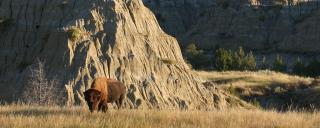| Scientific Name |
Bison bison |
| Description |
Adult bison can weigh up to 2000 lbs (1200 lbs for females), and can reach 5 to 6.5 feet height at the shoulder. Juvenile coats are reddish and darken to dark brown as they age. Both male and female adults have curved horns that can reach 2 feet in length. |
| Habitat |
Grasslands and meadows. Wooded areas may be used for cover. |
| Food |
Graze on grasses and sedges |
| Range |
While once present throughout North Dakota populations were decimated by market hunting and livestock-borne diseases. Currently there are small herds in the Theodore Roosevelt National Park, the Cross Ranch Nature Preserve and on a few other public and private lands. |
| Mating |
Breeding peaks in late July and early August. Temporary tending behavior rather than permanent bonding occurs. Gestation averages 258 days. Twins rarely occur. |
| Young |
Newborns weigh an average of 44 pounds. Young nurse for 7-8 months, but begin grazing attempts around 5 days old. |
| Habits |
Bison generally stay in small groups (10-20 animals). Adult bulls may be solitary or stay in small groups with other adult males outside of breeding season. Animals generally feed during the day, but may feed or travel at night as well. |
| Fun Facts |
Bison are North America's largest native land mammal and are considered livestock in North Dakota. |


